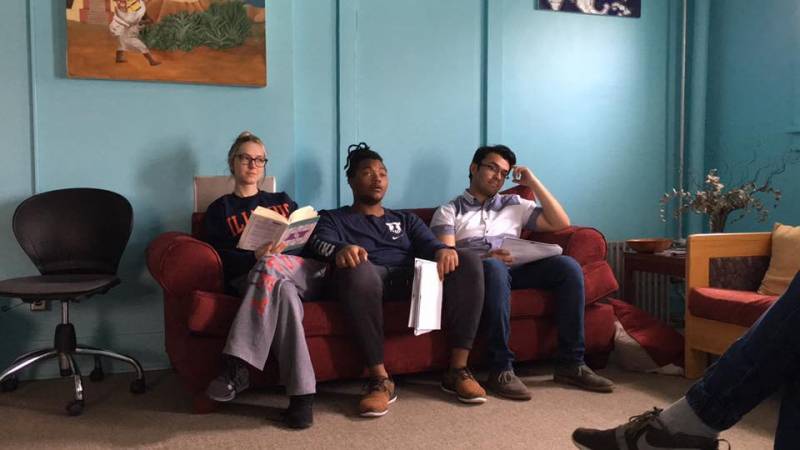As I walked into the Latina/Latino Studies building at the University of Illinois, I felt invited by the colorful walls and paintings in the hallways. I took my seat in a brightly painted turquoise classroom, the floor covered with blankets and pillows, which were also for the audience to sit on. The audience was packed, all of us seated snugly shoulder to shoulder in this intimate and joyful space with the sound designer, Fiona Ngô, tucked behind the audience with a synthesizer and other musical instruments. The space felt like a sanctuary, a slumber party; it felt like a community gathering to watch our favorite cult classic in a friend’s living-room DIY-style movie theater (during the performance we were even given popcorn and cookies by the actors). The Brown Theatre Collective’s performance of The Successful Life of 3, a play by Maria Irene Fornés, co-directed by Jess Kadish-Hernández and Melody Contreras, ignited Fornés subversive, avant-garde sensibility through absurd and outrageous humor, infecting the audience with laughter and excessive emotionality. Our excitement and reaction was as much a part of the performance as the actors reading the text. I was indulging in every moment of our collective failure to behave according to theatrical conventions as the actors negotiated their tumultuous, flawed, and hilarious love trio.
According to the program note, “The Brown Theatre Collective is an interdisciplinary political and aesthetic platform, turning to performance art, theatre, dance, music, visual art, and the interconnection between these art forms, as tools for cultural engagement and social change. In all our work, we emphasize how important it is to view modes of difference in direct conversation; for example, race, ethnicity, gender, sexuality, and other markers of identification and representation are explored together through different ways of telling stories. In our practice, we use workshops, intensive labs, sound sessions, staged readings, improv comedy, poetry slams, theatrical productions, and performance art to advance our creative mission.”
The production begins with ethereal technological and naturalistic sound that in my mind resembles a scratchy old record in a wind storm. The Narrator, played by Adonis Holmes April 27th and Christian Wilson April 28th, jumps up onto a table in the back corner of the audience, startling us with a loud stomp, breaking us into another place and time. Holmes, in all seriousness and directness which makes his interruptive timing even more comical, introduces the scene: He, described as a sexy young man played by Alejandro Mata, and 3, a middle-aged man played by Ethan Miles Perry, wait for appointments in a doctor’s office. It’s unclear whether the two characters are meeting for the first time or whether they have known each other for a while, but a “masculine rivalry” and flirtatious intimacy is established between them from the get-go. She, introduced as a sexy young lady played by Sophie Ruiz-Gehrt, walks in as the nurse to the sounds of Ngô’s sultry jazzy synthesizer, perhaps placing us in the 60s or 70s. She is wearing a blonde wig, bright red lipstick, black booty-shorts, and a white t-shirt. The costume leaves a lot to the imagination, but humorously references nurse-fantasies as she walks through the audience, stroking us as she passes and stopping to listen flirtatiously with her probing stethoscope.

Although He is described as the sexy young man, it is clearly 3 who is winning, at least sexually, with She. Marriage is arbitrary, the irreverent She marries He for his money and has copious amounts of kids with him, played by all of us in the audience, while sleeping with 3. For a moment, I wonder whose child I really am. The names He, She, and 3 lend themselves to fluid interpretations of the character’s gender, sexuality, and age. This is brilliant. The narrator introduces who the characters are, but there is the potential for the actors to not match the descriptions or for different descriptions to be substituted into the play. Especially the name 3, could certainly be open to dramaturgical interpretation subverting even further the conventions of naming and identifying. 3 is introduced as the middle-aged man in this version, but is played by a young man who doesn’t attempt to come across as old in gesture or costume and in fact, although not described as sexy, seems to please She more than the self-described sexy He. This contradiction leads us to realize that things aren’t always as they seem to be in relationships or in the way we identify ourselves or are identified.
In this play, there are no winners and losers. The characters are as chaotic as their relationship and we are all involved in this orgy. Leaving, remarrying, divorcing, returning, but after durations of three (three days, three weeks, three years, etc.) always returning, the characters wait for each other to come back and they always do. There is hope even in this tumultuous place. She abandons her kids and appears to be dim-witted, her glitchy thinking animated by Ngô’s pac-man-like sounds, we can see arcade lights of thought flashing from behind her eyes as she wiggles her eyebrows and contorts her mouth waiting for her brain to form an answer which never comes. 3 steals from the rich and the poor and is arrested by the usher/body-guard/police officers until he stages a revolt and kills them with a squirt gun. He is egoistical and tries to fit his relationship with She into his disillusioned idea of married family life. The character’s turmoil and character flaws will left me gasping, rolling out of your seat with laughter, and interjecting out loud, while falling even more deeply in love with every one of them.
The performance ends with a gut-busting Vaudevillian musical number during which the whole cast roars “Let me wrong and don’t have to know it!”, jovially and loudly celebrating their wrongness, difference, and personal faults. To me the success in The Successful Life of 3, is precisely in its failures: in the ending of the music lasting a little (or a lot) too long, in the flaws of the characters as they negotiate their relationship, in the inability to keep quiet and still according to convention as an audience member. These indulge us in the experience of comedic timing and the celebration of our failures and differences, suggesting that there are possibilities for ways of being that embrace and love difference during this political moment when difference is often staged as the obstacle. The success is in the necessary resistance that failure and difference create. At the end of the performance, we all gathered in a nearby classroom for snacks, refreshments, mingling, after-care, and communal celebration.
___________________________________________________________________
The Brown Theatre Collective was co-founded by Dr. Sandra Ruiz and Mateo Hurtado. For more information please visit their website.
Photos by Dr. Alicia Rodriguez








